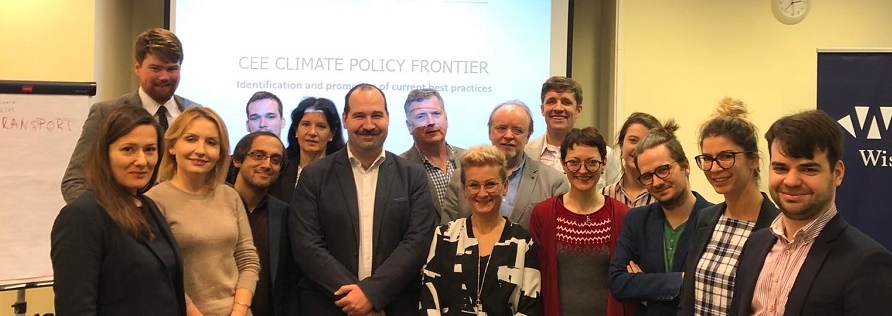Climate Policies for Transport and Buildings
On the 7th February 2020, our second workshop in Warsaw brought together experts from government, industry, non-governmental organisations and analytical centres in the Visegrád (V4) Group – Poland, Czech Republic, Slovakia and Hungary – to assess the challenges and opportunities for adopting best climate policy practices in the transport and buildings sectors. Attendees heard from Western European experts on their experiences implementing best practices in climate policy, and discussions were centred around policy applicability in and across the V4 countries.

The event was organised within the framework of the CEE Climate Policy Frontier project, supported by the European Climate Initiative (EUKI) and implemented by Climate Strategies, WiseEuropa, Expert Forum and Climate Analytics.
Andrzej Ancygier, Senior Climate Policy Analyst at Climate Analytics opened the workshop by giving an overview of the analytical stocktake on climate action progress in the transport and buildings sectors in the CEE region, detailing the opportunities and barriers for transferring best policy practices within the V4, Bulgaria and Romania. Participants were then divided into parallel working groups. The transport sessions were focussed on sustainable transport modes and electromobility, while the buildings sessions were focussed on energy efficiency and clean heating sources.
The policies presented in each session were discussed and assessed by the participants for applicability in the V4, using criteria such as: the availability of public and private financing, quality of cooperation between stakeholders, know-how potential, political willingness, public acceptability, and supportive policy frameworks for the introduction of the new instrument. Supporting these assessments, presentations were given on: The Netherlands Action Plan on Electric Vehicles by Sonja Munnix, Senior Advisor on Electric Mobility, Netherlands Enterprise Agency; the ElectriCity partnership in Sweden by Peter Nordin, City Mobility Director from Volvo; and the London Low Emission Zones by Olivia Crowe, Climate Strategies. In parallel, the building policy assessments were supported by input from Senta Schmatzberger, Buildings Performance Institute Europe on the German Energy Efficiency Construction and Refurbishment (EECR); Karolina Marszal, WiseEuropa on the Swedish Subsidies and Consumer Protection Programmes; and Wolfgang Amann, Managing Partner at the Institute for Real Estate Building and Living on Austrian Direct Grants and Housing Subsidies for solar plants and heating system control.
The second part of the day consisted of a cross-country evaluation, including a discussion of the common challenges and opportunities across the V4 region bringing together ideas from earlier discussions. This was followed by a practical exercise conducted in working groups, where participants identified key problems and pathways for their solutions. This included proposed actions, activities, responsibilities and stakeholder identification. This was an important opportunity to exchange ideas on possible interventions and to develop collaborative solutions, leveraging both the collective expertise of the participants and the information from the best practice policy options that had been explored throughout the day.
With a focus on V4 countries, participants took the opportunity to exchange ideas and learn about the similarities and differences in the challenges they are facing. In the light of this and the previous workshops, the exploration of policy practices across Europe and the strengthening of networks will support the next steps needed move the CEE Climate Policy Frontier closer to the Paris Agreement goals.
Workshop Presentations
Successfull stories presentations
- United Kingdom Congestion Charging Scheme Climate Strategies (pdf,1 MB)
- Sweden Subsidies and Consumer Protection Programmes WiseEuropa (pdf,667 KB)
- Sweden _ ElectriCity Partnership _ Peter Nordin (pdf,5 MB)
- Netherlands Action Plan on Electric Vehicles Sonja Munnix (pdf,2 MB)
- Germany Buildings in the spotlight Senta Schmatzberger (pdf,2 MB)
- Austria Direct Grants and Housing Subsidies Wolfgang Amman (pdf,2 MB)
